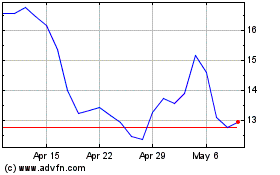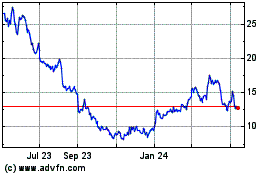- 100 percent of genotype 1b (GT1b)
patients who received VIEKIRAX + EXVIERA without ribavirin for 12
weeks, achieved SVR48 in a post-hoc analysis, regardless of whether
baseline NS5A RAVs were present1
- 97 percent of genotype 1a (GT1a)
patients, with or without baseline NS5A RAVs, who received the
regimen with ribavirin achieved SVR481
Enanta Pharmaceuticals, Inc., (NASDAQ:ENTA), a research and
development-focused biotechnology company dedicated to creating
small molecule drugs for viral infections and liver diseases,
announced today data showing that patients with genotype 1 (GT1)
chronic hepatitis C virus (HCV) infection who received the
recommended regimen of AbbVie’s VIEKIRAX®
(ombitasvir/paritaprevir/ritonavir tablets) + EXVIERA® (dasabuvir
tablets), with or without ribavirin (RBV), achieved high sustained
virologic response rates at 48 weeks post-treatment (SVR48),
regardless of the presence of baseline resistance-associated
variants (RAVs).1 These late-breaking data from a post-hoc analysis
of five completed Phase 3 clinical trials will be presented today
at The International Liver Congress™ (ILC) 2016, in Barcelona,
Spain.
Paritaprevir is Enanta’s lead protease inhibitor identified
within the ongoing Enanta-AbbVie collaboration and is one of the
direct-acting antivirals in AbbVie’s VIEKIRAX + EXVIERA treatment
regimen for chronic hepatitis C virus (HCV).
The study found that no matter whether certain NS5A RAVs were
present, 100 percent (n=148/148) of patients with GT1b chronic HCV
infection who received VIEKIRAX + EXVIERA without RBV for 12 weeks,
achieved SVR48.1 Results also showed 97 percent of patients with
GT1a chronic HCV infection with or without baseline NS5A RAVs
(n=57/59 and n=351/361 respectively) achieved SVR48 when receiving
the recommended regimen of VIEKIRAX + EXVIERA with RBV.1 These
findings included patients new to therapy and patients previously
treated with pegylated interferon/ribavirin (pegIFN/RBV)
(treatment-experienced), as well as GT1 patients with compensated
cirrhosis.1
As the hepatitis C virus replicates, variants of the viral NS5A
protein are produced.2 The impact of these variants on treatment
response, including the possibility of becoming resistant to
therapy or achieving SVR, has yet to be fully determined.3
To understand more about the impact of variants on treatment
response, next-generation sequencing was used to assess baseline
samples for variants in NS5A, which were detected in 11 percent of
GT1a patients and 19 percent of GT1b patients, with a detection
threshold of 15 percent, consistent with the limits of detection
for variants by population sequencing.1 The post-hoc analysis was
performed on data from five completed Phase 3 studies:1 PEARL-IV
(GT1a treatment-naïve, n=90), SAPPHIRE-II (GT1a pegIFN/RBV
treatment-experienced, n=214), TURQUOISE-II (GT1a compensated
cirrhosis – 24 week treatment arm, n=118), PEARL-II (GT1b
pegIFN/RBV treatment-experienced, n=89) and TURQUOISE-III (GT1b
compensated cirrhosis, n=59). Patients who did not achieve SVR for
reasons other than virologic failure (such as early treatment
discontinuations or SVR12 data unavailable) were excluded from the
analysis.
About VIEKIRAX® + EXVIERA®VIEKIRAX + EXVIERA is approved
in the European Union for the treatment of genotype 1 (GT1) chronic
hepatitis C virus (HCV) infection, including patients with
compensated cirrhosis. VIEKIRAX is approved in the European Union
for the treatment of genotype 4 (GT4) chronic HCV infection.
VIEKIRAX tablets consist of the fixed-dose combination of
paritaprevir 150mg (NS3/4A protease inhibitor) and ritonavir 100mg
with ombitasvir 25mg (NS5A inhibitor), dosed once daily. EXVIERA
tablets consist of dasabuvir 250mg (non-nucleoside NS5B polymerase
inhibitor) dosed twice daily. VIEKIRAX + EXVIERA are taken with or
without ribavirin (RBV), dosed twice daily based on patient type.
VIEKIRAX + EXVIERA is taken for 12 weeks with or without RBV,
except in genotype 1a and GT4 patients with compensated cirrhosis,
who should take it for 24 weeks with RBV.
EU IndicationVIEKIRAX is indicated in combination with
other medicinal products for the treatment of chronic hepatitis C
(CHC) in adults. EXVIERA is indicated in combination with other
medicinal products for the treatment of CHC in adults.
Important EU Safety Information
Contraindications:VIEKIRAX + EXVIERA are contraindicated
in patients with severe hepatic impairment (Child-Pugh C). Patients
taking ethinyl estradiol-containing medicinal products must
discontinue them and switch to an alternative method of
contraception prior to initiating VIEKIRAX + EXVIERA. Do not give
VIEKIRAX with certain drugs that are sensitive CYP3A substrates or
strong inhibitors of CYP3A. Do not give VIEKIRAX and EXVIERA with
strong or moderate enzyme inducers. Do not give EXVIERA with
certain drugs that are strong inhibitors of CYP2C8.
Special warnings and precautions for use:VIEKIRAX and
EXVIERA are not recommended as monotherapy and should be used in
combination with other medicinal products for the treatment of
hepatitis C infection.
Risk of Hepatic Decompensation and Hepatic Failure in Patients
with CirrhosisVIEKIRAX and EXVIERA are not recommended in patients
with moderate hepatic impairment
(Child-Pugh B). Patients with cirrhosis should be monitored for
signs and symptoms of hepatic decompensation, including hepatic
laboratory testing at baseline and during treatment.
ALT elevationsTransient elevations of ALT to >5x ULN without
concomitant elevations of bilirubin occurred in clinical trials
with VIEKIRAX + EXVIERA and were more frequent in a subgroup who
were using ethinyl estradiol-containing contraceptives.
Pregnancy and concomitant use with ribavirinExtreme caution must
be taken to avoid pregnancy in female patients and female partners
of male patients when VIEKIRAX with or without EXVIERA is taken in
combination with ribavirin, see section 4.6 and refer to the
Summary of Product Characteristics for ribavirin for additional
information.
Use with concomitant medicinal productsUse caution when
administering VIEKIRAX with fluticasone or other glucocorticoids
that are metabolized by CYP3A4. A reduction in colchicine dosage or
interruption in colchicine is recommended in patients with normal
renal or hepatic function. VIEKIRAX with or without EXVIERA is
expected to increase exposure of statins so certain statins need to
be discontinued or dosages reduced. Low dose ritonavir, which is
part of VIEKIRAX, may select for PI resistance in HIV co-infected
patients without ongoing antiretroviral therapy. HIV co-infected
patients without suppressive antiretroviral therapy should not be
treated with VIEKIRAX.
Adverse ReactionsMost common (>20 percent) adverse
reactions for VIEKIRAX + EXVIERA with RBV were fatigue and
nausea.
Full summary of product characteristics is available
at www.ema.europa.eu
Globally, prescribing information varies; refer to the
individual country product label for
complete information.
About EnantaEnanta Pharmaceuticals is a research and
development-focused biotechnology company that uses its robust
chemistry-driven approach and drug discovery capabilities to create
small molecule drugs for viral infections and liver diseases.
Enanta’s research and development is currently focused on four
disease targets: Hepatitis C Virus (HCV), Hepatitis B Virus (HBV),
Non-alcoholic Steatohepatitis (NASH) and Respiratory Syncytial
Virus (RSV).
Enanta has discovered novel protease inhibitors and NS5A
inhibitors that are members of the direct-acting-antiviral (DAA)
inhibitor classes designed for use against the hepatitis C virus
(HCV). Enanta’s protease inhibitors, developed through its
collaboration with AbbVie, include paritaprevir, which is contained
in AbbVie’s marketed DAA regimens for HCV, and ABT-493, Enanta’s
second protease inhibitor, which AbbVie is developing in phase 3
studies in combination with ABT-530, AbbVie’s NS5A inhibitor.
Enanta has also discovered a cyclophilin inhibitor, EDP-494, a
novel host-targeting mechanism for HCV, which is now in phase 1
clinical development, and EDP-305, an FXR agonist, which Enanta
plans to advance into clinical development for NASH later in 2016.
Please visit www.enanta.com for more information on Enanta’s
programs and pipeline.
Forward Looking Statements DisclaimerThis press release
contains forward-looking statements, including statements with
respect to the prospects for AbbVie’s HCV treatment regimens
containing paritaprevir and Enanta’s other research and development
programs. Statements that are not historical facts are based on
management’s current expectations, estimates, forecasts and
projections about Enanta’s business and the industry in which it
operates and management’s beliefs and assumptions. The statements
contained in this release are not guarantees of future performance
and involve certain risks, uncertainties and assumptions, which are
difficult to predict. Therefore, actual outcomes and results may
differ materially from what is expressed in such forward-looking
statements. Important factors and risks that may affect actual
results include: the efforts of AbbVie (our collaborator marketing
VIEKIRAX) to market and sell VIEKIRAX-containing regimens; the
development, regulatory and marketing efforts of others with
respect to competitive HCV treatment regimens; regulatory and
reimbursement actions affecting VIEKIRAX, any competitive regimen,
or both; and other risk factors described or referred to in “Risk
Factors” in Enanta’s most recent Form 10-K for the fiscal year
ended September 30, 2015 and any other periodic reports filed more
recently with the Securities and Exchange Commission. Enanta
cautions investors not to place undue reliance on the
forward-looking statements contained in this release. These
statements speak only as of the date of this release, and Enanta
undertakes no obligation to update or revise these statements,
except as may be required by law.
____________________________________________
1Sarrazin C, et al. Effect of Baseline Resistance-Associated
Variants on SVR with the 3D Regimen plus RBV. Late Breaker Poster
#LBP503; presented at the International Liver Congress™ (ILC) The
Annual Meeting of the European Association for the Study of the
Liver (EASL) in Barcelona, April 13-17, 2016.
2 Schneider MD, et al. Antiviral therapy of hepatitis C in 2014:
do we need resistance testing? Antiviral Res. 2014
May;105:64-71.
3 American Association for the Study of Liver Diseases.
Monitoring patients who are starting hepatitis C treatment, are on
treatment, or have completed therapy, February 24,
2016, http://www.hcvguidelines.org/full-report/monitoring-patients-who-are-starting-hepatitis-c-treatment
are-treatment-or-have. Accessed March 15, 2016.
View source
version on businesswire.com: http://www.businesswire.com/news/home/20160413006716/en/
Investor ContactEnanta Pharmaceuticals, Inc.Carol Miceli,
617-607-0710cmiceli@enanta.comorMedia ContactMacDougall
Biomedical CommunicationsKari Watson,
781-235-3060kwatson@macbiocom.com
Enanta Pharmaceuticals (NASDAQ:ENTA)
Historical Stock Chart
From Mar 2024 to Apr 2024

Enanta Pharmaceuticals (NASDAQ:ENTA)
Historical Stock Chart
From Apr 2023 to Apr 2024
